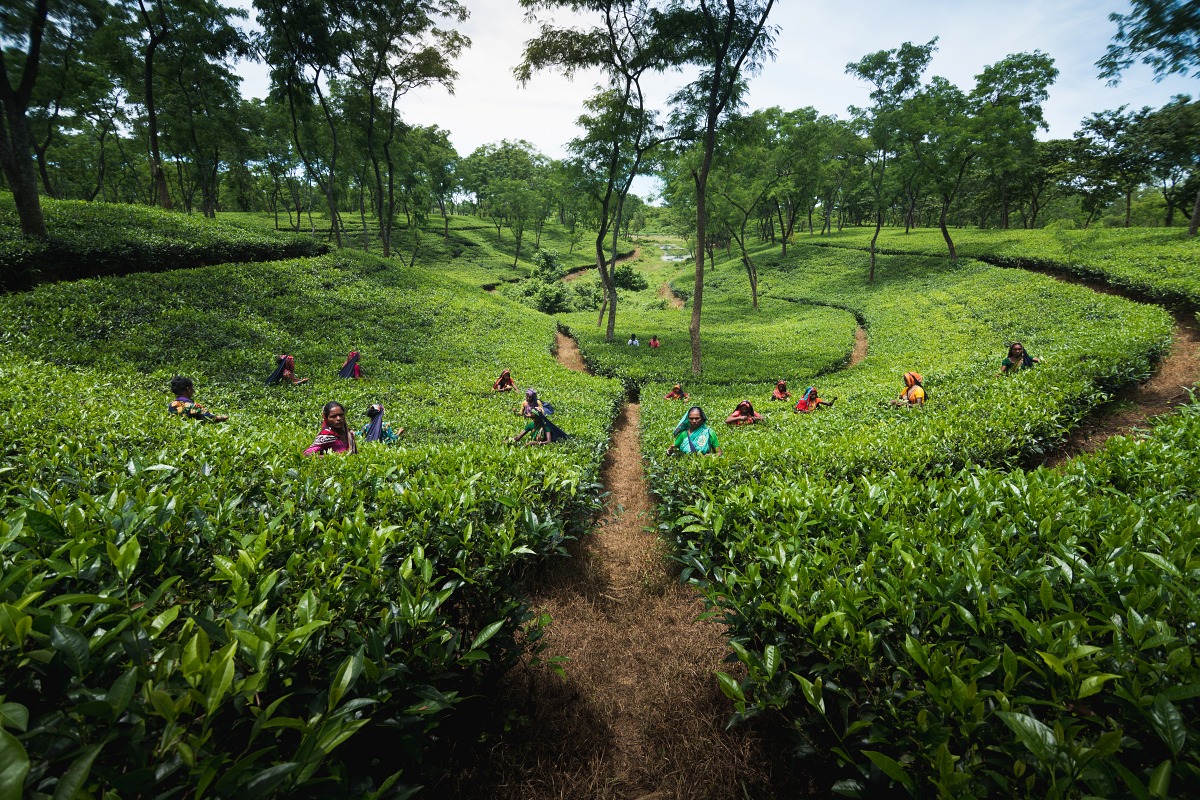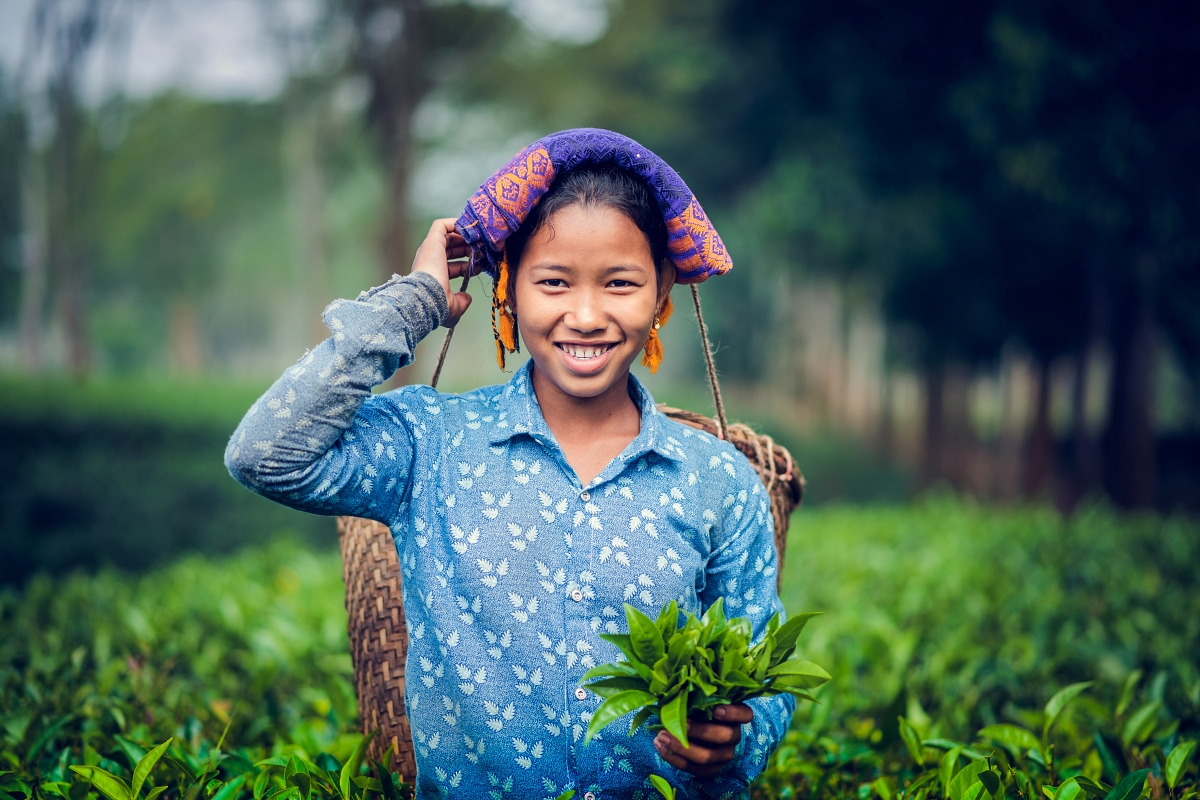Nurturing the Tea Culture
The wheels of fortune for Halda Valley turned from a completely barren land to a buzzing tea garden in less than 18 years. Dr Shamim Khan, director of the tea brand, shares with Colors’ Lamyaa Yushra the journey of how Halda Valley tea has become one of the country’s most prominent tea brands.

Situated in Fatikchhari, the tea company Halda Valley shares its name with the tenderly flowing river named the Halda. It was registered as a new tea estate and started its journey in 1930 under the management of the then British ruled India. Before the current ownership, it changed the hands of six government and private companies between 1930 and 2002. Under the new leadership of chairman Nader Khan, Halda Valley has witnessed a new light of day as he completely turned the fortune for Halda Valley from a completely barren land to a buzzing tea garden.
“Truly speaking the story is not only about putting a strong foothold in the tea market, but it was also all about love for tea,” says Dr Shamim Khan, son of Nader Khan and Director of the company. “If you consider the fact that a businessman invested in a barren tea garden with zero experience and to develop it from scratch is not something you see every day. From a business point of view, it’s not actually feasible. What my father did was that he basically bought a jungle beside the Halda river. There was no cultivation when our company took over the Halda Valley. My father wanted to make a difference in the Bangladeshi tea industry which he achieved through his perseverance and devotion wheels of towards his passion and also his love for nature and tea.”
But to achieve such a position, the journey of Halda Valley has been an uphill climb. When Nader Khan bought the tea estate in Fatikchhari, 61 kilometres away from Chattogram, it was nothing but wild bushes and rainforests because the land has been deserted for many years. So, he took it upon himself to make Halda Valley a masterpiece out of barren land. In the early years when the seeds were planted, the leaves dry down due to a lack of irrigation. It was a trial-and-error process. Then Nader Khan introduced an advanced irrigation system adapted from Thailand. The formula clicked and from there it all started coming together. The cultivation system was improved with a 100 percent permanent irrigation system covering more than 1,100 acres of land. Within a span of 15 years of its inception, Halda Valley became the highest-yielding tea estate in terms of production and for the last five years, it has been the top tea garden among all the 163 gardens. In 2020, Halda Valley produced 3,380 kg CTC tea per hectare whereas the national average production was 1250 kg per hectare. In 2010, Halda Valley was nationally recognized for having the highest number of tea plantations in Bangladesh and was awarded the first prize in the Tree Plantation Category.
Today, Halda Valley is producing the highest quality tea of different varieties for millions of tea lovers every day. After yielding black tea, Halda has started producing speciality category tea like Dragon Well Green Tea and Silver Needle White Tea. These are expensive tea varieties processed from the finest buds and leaves of Camellia sinensis. Experienced ‘tea masters’ from China visit to evaluate and improve the tea quality each year.
“It was a very long and exciting journey because whatever my father envisioned came to fruition and now, we are excelling in this field with utmost dedication,” explains Dr Shamim, who joined the family business in 2016 following in his father’s footprint.
Although Dr Shamim was pursuing a higher medical degree in Orthopedic Surgery, later upon his father’s request, he stepped into the business and is currently serving as the Managing Director of Halda Valley Food and Beverage Ltd. He was the one who stepped up to build the Halda Valley Tea brand.
The philosophy behind this tea brand is to offer the best quality tea rich in flavour, aroma with subtle characteristics that are packed garden fresh at source and add more value to the tea market in Bangladesh, a philosophy nurtured by the father and the son.
The Halda Valley tea estate is sprawled over 1,052 acres of land and there have been plans of expansion. He says, “Our main concern is to utilize the land with utmost productivity so we have applied for a lease to expand.”
Back in 2014 Halda Valley was specializing in the Dragon Well Green Tea, a favourite in China and was aiming to capture the international market. With that vision in mind, Halda Valley started exporting and earned positive responses from international clients. Soon it gained momentum and attracted many other foreign markets. Halda has exported to China, Kuwait and England.
The positive feedback propelled Halda Valley to introduce speciality tea for local consumers. The Bangladeshi tea market is growing rapidly because people were getting health conscious so sipping a cup of tea filled with health benefits is what the local consumers needed and that’s what Halda Valley tea provided them with. Despite being a tea-loving nation, Bangladeshis are yet to appreciate speciality tea that was widely available abroad. Halda Valley has taken the opportunity to introduce Bangladeshi consumers to the speciality tea with fresh leaves plucked straight out of the lush green tea garden.

“I felt like,’ Dr. Shamim says, “rather than focusing solely on the international market, why not hit the Bangladeshi market which has been occupied by international brands because of the market demand. As you already know the market of green tea was just starting to grow but the thing called high-value tea or speciality tea was missing in our country and our main focus is to work for a niche market and for those who are genuine tea lovers.”
He thinks there is an aesthetic aspect behind it because many countries like Japan, China and other Southeast Asian nations are accustomed to the speciality tea and it’s sold at a cutthroat price. If we compare the Bangladesh market and that the economy is growing it is wise to say the demand for speciality tea is on the rise. It’s a matter of beauty and comfort while consuming the tea with fine leaves which creates something aesthetic with her exquisite aroma and flavour.
He considers globalization as an important factor as well; the more people are travelling, the more they are learning about the culture of other countries. Thus people are developing a taste and those who are tea lovers are also bringing tea here at a high price.
Elaborating on their plan, he says, “Our current plan is to explore more on the global tea market and increase export volume. We are now negotiating terms with Japanese, American and Russian importers along with some other foreign importers who have shown very good interest. If it goes on like this, we will be able to make a significant mark in the global tea market in the near future.”
When asked about what makes Halda Valley tea so special, Dr Shamim says emphatically, “We are producing the best quality speciality tea in our own land from our very own Camellia leaves. We are the ones who explored, produced and created this market of speciality tea in Bangladesh for the first time. And I’m putting emphasis over and over again on the tea and its packaging quality on top of other marketing strategies. Due to higher quality, the price at which you are consuming the Halda Valley tea is higher than some other local brands. Unlike the tea varieties, other brands which mostly come in crushed form, our speciality tea varieties are presented in loose form, made of selectively plucked fine leaves, one bud one leaf combination and it’s processed minimally.”
Staying true to the motto of providing tea lovers with the authentic experience of tea, Halda Valley launched a tea lounge in 2019, the first of its kind so that tea lovers can enjoy a meeting over a cup of tea. “With this tea lounge, we are committed to offering the highest possible tea experience. We host a tea ceremony twice a week and our staffers are well educated and groomed on quality customer service. So whenever a customer orders tea our staff member shares stories behind that tea with the customer, thus enlighten the guests on the tea they are about to enjoy.”
In the future, Halda Valley is planning to host tea tasting sessions with professional tea tasters and show how it’s done in the tea testing lab. “On top of that, we also want to arrange a visit to our tea garden if a customer shows interest in how tea is being produced. We are developing bungalows for our guests and it will be done in a few months’ time. As a result, customers will be able to visit tea gardens and also have an organized guided tea tour showing them the process of how tea is being made. We want to generate the highest possible tea experience through Halda Valley which has not been done before in Bangladesh. Basically, when someone steps into Halda Valley what will happen is an unveiling feeling of stepping into the world of tea,” he explains with aplomb.
As future plans remain big for Halda Valley one can say that the tea industry has gone through tremendous progress and local tea producers are contributing to the industry with a booming return. And tea continues to be embedded in Bangladeshi culture. Dr Shamim concludes, “It’s not merely a tea business, it’s about nurturing the tea culture in the most elegant and passionate way.”

